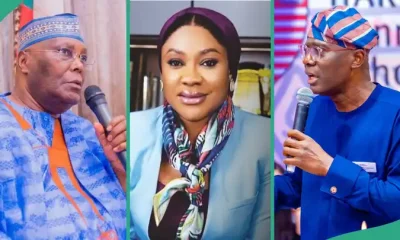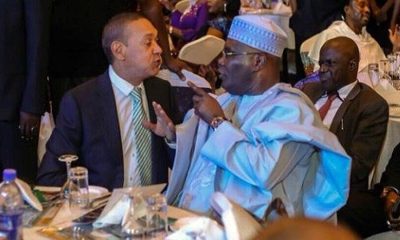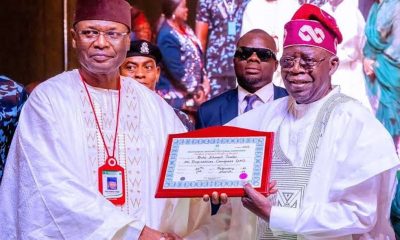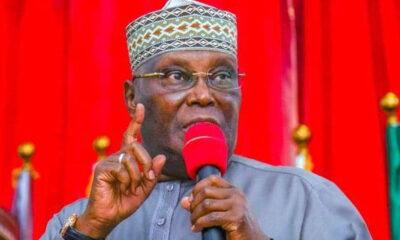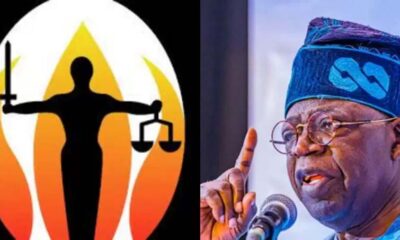Opinion
The Chicago bullfight between Atiku and Tinubu – Simon Kolawole
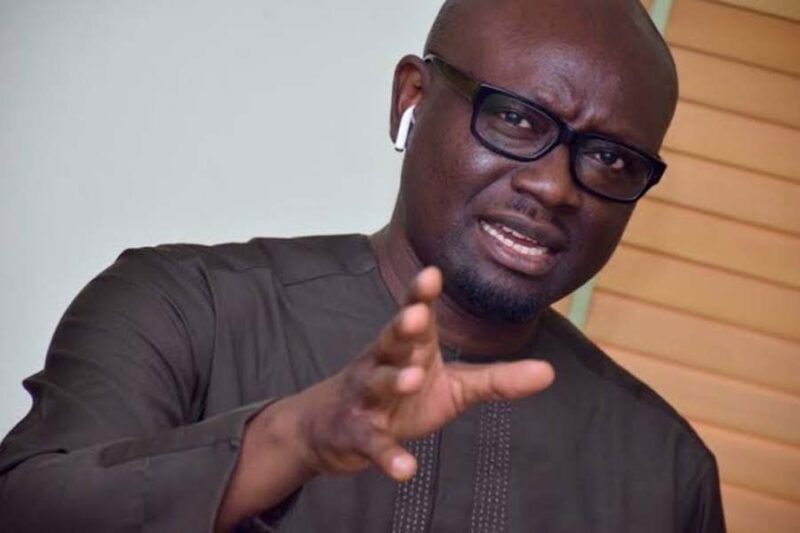
The Chicago bullfight between Atiku and Tinubu – Simon Kolawole
May I, at this point, humbly retract certain claims I made in my article, ‘Tinubu and Atiku: Birds of a Feather’ (THISDAY, June 12, 2022), months before the 2023 presidential election. In it, I claimed that Asiwaju Bola Ahmed Tinubu and Alhaji Atiku Abubakar “are friends, associates and two peas in a pod”. I traced their bond to the annulled third republic. I said they had been there for each other during political upheavals. As simple as it was, I didn’t remember that there are no permanent friends or foes in politics. Just permanent interests. All gloves are off now. Atiku is on an all-out war with Tinubu whom he wants disqualified and removed as president for alleged certificate forgery.
On Thursday, Atiku revealed that he had parted ways with Tinubu as far back as 2007. I hereby confess that I did not know this. In separate private conversations I had with both men before 2007, they came across as David and Jonathan. What we have today is nothing but Cain and Abel, although I’m not sure who is the Cain and who is the Abel. As Atiku has now told us, they cut political ties when he refused to make Tinubu his presidential running mate in 2007 because of the Muslim-Muslim ticket complications. I recall Tinubu opposing Atiku’s election petition against President Umaru Musa Yar’Adau in 2007 on the ground that all of them were from the same political family.
To be sure, this is not the first time Atiku is seeking a judicial decision on the basis of certificate in a presidential election. In 2019, he fought President Muhammadu Buhari all the way to the Supreme Court, maintaining that he did not have the requisite educational qualification to be president. Buhari had listed secondary school education on his INEC form but did not attach the West African School Certificate, which he claimed was with the military authorities. He eventually received a replacement from Cambridge, which used to conduct the WASC exams, and presented it to the tribunal. Atiku’s petition was dismissed. He also lost in the Supreme Court — but Buhari was hurt.
This time around, Atiku is seeking to prove that the Chicago State University (CSU) certificate presented to INEC by Tinubu is a forgery and, therefore, he was not qualified to run in the first place. Many people did not really give serious attention to this allegation in Atiku’s petition until he went to file for “discovery” at a US court on August 2, 2023, seeking an order to compel CSU to release Tinubu’s academic records. This was a day after the presidential election petition court (PEPC) had announced that it was adjourning to deliver judgment after all the petitioners, Atiku inclusive, and respondents had concluded their submissions. The US case, thus, basically went under the radar.
READ ALSO:
-
I lost movie roles over my physical appearance – Funke Akindele
-
Stop blackmailing Muslim leaders, MURIC warns HURIWA
-
Bandits kidnap 30 farmers in Kaduna
The PEPC actually prevented Atiku from arguing the forgery allegation on a technical ground. Atiku’s lawyers introduced the triple allegations of Tinubu’s conviction in the US, forgery of documents and dual citizenship long after they had filed the petition. The certificate was notably not on their list of proof of evidence. However, as the proceedings went, they introduced the issues. Tinubu’s lawyers said the time for filing new facts was over. Atiku’s lawyers said they were only providing further details. The PEPC, in its judgment, held that the electoral law provides that all evidence must be frontloaded and since this was not contained in the petition itself, Atiku had missed the timeframe.
In truth, Atiku did not have what he could present as evidence as at the time the PEPC sat and gave judgment. Maybe the lack of evidence contributed to the little attention paid to Atiku’s moves in the US. With the PEPC judgment going against Atiku on September 6, he decided to head to the Supreme Court — this time hoping that he could file a new evidence on the authenticity of Tinubu’s CSU certificate, known as “diploma” in the US. Still, many did not give much attention to this case until September 19 when the US court ordered CSU to release the academic records in time for Atiku’s appeal at the Supreme Court. It was at this stage that the internet caught fire as interest ballooned.
What did Atiku want to prove by demanding all these records? From all that I have read so far, I would summarise his intentions as follows: (1) to prove that the certificate Tinubu presented to INEC was forged (2) to argue that this is not the real Bola Tinubu (3) to create a moral crisis for Tinubu home and abroad. When Tinubu’s lawyers protested against the release of his records claiming it could hurt their client, even his own supporters began to panic. Many of them asked: “What is Tinubu trying to hide?” My first reaction was that his lawyers were trying to be dramatic. I had always believed Tinubu attended and graduated from CSU but that the devil is in the details.
Tinubu’s records were finally released. The CSU registrar, Caleb Westberg, made a deposition as a witness and representative of the university. He had previously sworn to an affidavit as well. If you lie under deposition, it is called “perjury” and you will have no option than to go to jail. So, it is not a joke. We all looked forward to the deposition as the final stage of the US leg in the post-election litigation. Atiku’s lawyers questioned Westberg extensively on the affidavit and the records. Westberg said so many things that, at a stage, my head was steaming from information overload. At the end of the deposition, the camps of Atiku and Tinubu both claimed to have won. It got more interesting.
I will try to summarise the testimonies as I understand them. Westberg swore to an affidavit that Tinubu graduated and was awarded a degree with honours from CSU on June 22, 1979. He said CSU awarded him a diploma and subsequently provided a certified (that is, official) copy of that diploma. He said both are “valid and authentic” diplomas from the university. He said there are differences in font, seal and signatories on the diplomas because many things had changed over the decades from 1979, when Tinubu graduated, to the 1990s, when he got a replacement. He said the discrepancies in the dates on the documents were possibly human since they were entered manually.
READ ALSO:
-
PENGASSAN confirms return of fuel subsidy
-
Airlines cancel flights to Tel Aviv over Israel-Palestine conflict
-
Lagos govt vows to demolish illegal structures at Ogombo, Eti-Osa
In the affidavit that accompanied the academic records, Westberg said the format of Tinubu’s replacement diploma dated June 27, 1997 matches the format of diplomas produced in the 1990s and 2000s. From the deposition, it appears there are two different CSU diplomas. There is the CSU diploma issued in 1979 when Tinubu graduated and there is the replacement dated 1997. Meanwhile, a diploma was released to Mike Enahoro-Ebah, an Atiku supporter, based on a court order. It is either Enahoro-Ebah was given the original 1979 version (which Tinubu presumably did not pick up then) or Enahoro-Ebah was given a replacement Tinubu ordered and didn’t pick up.
The one presented to INEC by Tinubu was dated 1997. The date was declared an error by the university. Michael Hayes, who also testified for CSU, took personal responsibility for the error and said he meant to type 1979, not 1997. I recall that in my journalism school days when typewriters were a thing, we called this “error of transposition” — when you mistakenly hit the second key before the first, meaning “9” would come before “7” in 79. It appears that the certificate Tinubu presented to INEC was another version entirely — produced in the 1990s or 2000s. Westberg, in his deposition, said he did not see what was presented to INEC and could, therefore, not comment on it.
So, why did the university certify the documents? He said the university does not usually certify documents but this was at the insistence of Tinubu’s lawyer. “It seems to be a Nigerian thing,” he said. (By the time this got into social media, the registrar was reported to have said: “Forgery is a Nigerian thing.”) Westberg also addressed why they had copies of diplomas for 1979 but didn’t have one for Tinubu. He said some students don’t pick up their diplomas — tying it back to the fact that it is the transcripts, not the diplomas, that really matter in the US. It is copies of unclaimed diplomas that he released to Atiku’s lawyers with the names of the students redacted for privacy reasons.
What else? Westberg said Tinubu attended Southwest College (now known as Richard Daley College), a feeder school for CSU. He said the Tinubu that attended Southwest College and transferred to CSU had the same social security number (like the NIN in Nigeria), and that it is the same person that is now president of Nigeria. On why the gender of the student that attended Southwest was written as “F” (female), he said it was possibly a clerical error as he himself did not know whether Bola Tinubu is the name of a male or female. But he pointed out that Tinubu filled “male” in his application form and was addressed as “Mr” in the letter offering him admission.
READ ALSO:
-
Insecurity: FRSC seeks FG’s permission to bear firearms
-
Manchester United records a sensational Premier League victory against Brentford
-
Israel retaliation kills 230 Palestinians after Hamas operation
Overall, I think Atiku’s team conclusively proved at the deposition that the diploma presented to INEC by Tinubu was not the one issued in 1979 — as Enahoro-Ebah had obviously collected it or whatever version was in the file. And I think this is why Atiku’s supporters believe they won the tug-of-war. On the other hand, what Tinubu presented to INEC was not the 1979 diploma but a replacement. Westberg did not answer questions on the “INEC diploma” on the ground that it is not in the school’s possession. But he said Tinubu indeed applied for a replacement and if a 1979 diploma was to be replaced, there would be changes in format, font, seal and signatories as seen in the “INEC diploma”.
All eyes are now on the Supreme Court. Atiku’s lawyers will hope to use the academic records and the deposition to make a compelling case against Tinubu. There are still obstacles. One, they have to convince the court that a new evidence can be filed at this stage. If the Supreme Court exercises discretion and decides to allow new evidence, that will be a major hurdle scaled. The next hurdle will be the evidential weight the court attaches to it and if it is convinced beyond reasonable doubt that Tinubu actually committed forgery. These are the matters to be pursued and argued by the lawyers before the court. I can’t wait for all this to be over so we can face the core business of governance.
Whatever the case may be, this is a fight to the finish. No retreat, no surrender. I am, however, astonished at how Atiku has overtaken Peter Obi, the LP candidate, in the election petition race. Obidients had clearly dominated the airwaves in claiming Obi won the election and that Tinubu stole his mandate. Atiku, who officially came second, was always playing catch-up. But with a single burst of pace in September, Atiku has — like a seasoned marathoner — surged to the front in the race to upstage Tinubu. All the Obidients that I know are now rooting for Atiku. The enemy of my enemy is my friend. Remember: there are no permanent friends or foes in politics. Just permanent interests.
(THE CABLE)
Opinion
Barbaric mass burning of innocents in Edo, by Farooq Kperogi

Barbaric mass burning of innocents in Edo, by Farooq Kperogi
I woke up on Friday morning to a deluge of forwarded, unwatchably terrifying videos showing 16 Hausa hunters, who were traveling from Port Harcourt to Kano for the forthcoming Eid-el-fitr festivities, being lynched and burned alive by a mob of blood-thirsty savages in the town of Uromi in Edo State. I’ve been sick to my stomach.
My inquiry has led me to understand that the Uromi community has been gripped by abductions for ransom, which sometimes result in deaths. Seething with rage and vengeance over the incessancy of deadly kidnapping by “Fulani herdsmen,” the community was primed for jungle justice.
When local vigilantes accosted a bus traveling northward through the town, they found Hausa hunters armed with hunting guns and machetes aboard. In the bigoted, know-nothing estimation of the Uromi vigilantes, Hausa hunters were one and the same as Fulani kidnappers.
So, they burned the innocent Hausa hunters for the crimes of anonymous Fulani bandits. I honestly couldn’t bring myself to watch the dreadfully nightmarish videos to the end.
These sorts of savage slaughters of innocents persist in Nigeria not just because of a progressive loss of faith in formal institutions for the redress of communal grievance, heightened anxieties about safety, and increasing faith in the efficacy of jungle justice but also because of the absence of consequences for them.
As I pointed out when Deborah Yakubu was extrajudicially murdered by a mob of unhinged fanatics in Sokoto in May 2022, there is no greater enabler of jungle justice than a lack of consequence for it.
Sadly, when tragedies like this occur, there is a habitual, safe, standard, prepackaged rhetorical template that people in government effortlessly regurgitate. They promise to bring the perpetrators to justice, make performative arrests to quench public thirst for justice, and nothing else happens. That can’t continue.
When I called for the prosecution and public execution of the murderers of Deborah in 2022, I warned that it was necessary “to serve as an example to other would-be murderers.”
READ ALSO:
- Investigation of wanted businesswoman Achimugu not linked with Atiku, Sanwo-Olu – EFCC
- No Sallah durbar festival in Kano this year – Police warn
- $100m coin collection buried for decade to be auctioned
Of course, Deborah’s murder wasn’t the first example of jungle justice. Harira and her four children were ferociously murdered by maniacal thugs in Anambra State, and nothing was done about it. The list is too long to fit in a newspaper column. But I argued that it’s never too late to do the right thing.
I will repeat my plea. The murderers of these innocent travelers are easily identifiable from the videos that are circulating online. They should all be apprehended, tried, and executed in public to deter a repeat.
But, in the interest of proportionality of justice, this should not be limited to this Uromi incident. All cases of jungle justice should equally be punished the same way. The punishment for murder in both the Criminal Code and the Penal Code is death. The law should be followed.
Another thing that this incident instantiates is the danger of toxic ignorance. Before Muhammadu Buhari became president, all northerners in southern Nigeria used to be “Hausa,” irrespective of their ethnic and religious identities.
After Buhari became president, every northerner, especially if the northerner is also Muslim, became “Fulani,” which led me to write a June 5, 2021, column titled, “‘Fulanization’ of the North by the South.” The South, I wrote, was relentlessly rhetorically Fulanizing the North, particularly the Muslim North, just to fertilize and sustain a simplistic narrative.
This simplistic, misbegotten narrative probably led the Uromi mass murderers to assume that Hausa people with hunting instruments must be Fulani bandits since they have internalized the wrongheaded notion that all northern Muslims are “Fulani.”
Never mind that Hausa and Fulani communities in many northwestern states are at daggers drawn over kidnappings for ransom by Fulani outlaws, or that more northerners are kidnapped for ransom than people anywhere else in the country.
Trust TV, the broadcast arm of Daily Trust, did an informative documentary on March 5, 2022, titled “Nigeria’s Banditry: The Inside Story” that brought the tension between Fulani herders and Hausa people into focus.
A subsequent July 25, 2022, BBC Africa Eye documentary titled “The Bandit Warlords of Zamfara,” which got the hackles of the Muhammadu Buhari administration up, amplified the tensile relational dynamics between Hausa and Fulani communities in the northwest since kidnapping for ransom took roots in the region, transmuted into full-on terrorism, and finally morphed into the full-scale Hausa-versus-Fulani ethnic war, particularly in such states as Zamfara, Kebbi, and Katsina.
In response to the rural and urban banditry by mostly Fulani brigands against Hausa people in the northwest (Fulani people have also accused Hausa people of cattle theft, indiscriminate murders, and systematic exclusion), the BBC documentary tells us, Hausa people formed or strengthened preexisting vigilante groups called yan sakai or yan banga for self-defense against bandits.
READ ALSO:
- EFCC re-arraigns son of ex-PDP chairman for alleged N2.2bn oil subsidy fraud
- Group says Natasha’s recall will deepen democracy
- We welcome Gov Makinde’s U-turn on Shari’ah panel – MURIC
Yan banga groups originally come from traditional Hausa hunters’ associations and draw upon the skills and rituals commonly associated with traditional hunters (such as using charms, dane guns, and other traditional weaponry) for vigilante duties.
In other words, most of the Hausa hunters that the Uromi homicidal beasts murdered in cold blood to avenge the banditry of Fulani herders would be targets of elimination by Fulani bandits in the northwest. That’s double jeopardy.
The northwest is the theater of a ceaseless spiral of recrimination and reciprocal violence between the Hausa and Fulani communities, thereby imperiling the longstanding, Islamically-inspired ethnocultural synthesis that historically unites them.
Remarkably, this volatile dynamic persisted largely unnoticed by both national and global media until it was thrust into international consciousness through BBC Africa Eye’s seminal July 2022 “The Bandit Warlords of Zamfara” documentary.
The documentary revealed the paradoxical reality wherein, despite substantial overlaps in culture, religion, heritage, and linguistic traditions, the Hausa and Fulani populations remain predominantly segregated, particularly in rural areas. Intercommunity relations are characterized by persistent tensions that manifest in conflicts over scarce resources such as land, water, and sustenance.
But the rest of Nigeria has a hard time grasping the existence of tensile ethnic stress between Hausa and Fulani people in the north on account of banditry because the southern-dominated institutional news media in Nigeria, which help frame how we make sense of our social and cultural realities, lack ready-made, stereotypical mental representations with which to frame the conflict, so they either avoid reporting it altogether or minimize its horrors if they report it at all.
The news media thrive on Manichean binaries, conflictual differences, and sensation, which a conflict between Hausa and Fulani people doesn’t present. After all, a popular Yoruba epigram says, “Gambari pa Fulani ko lejo ninu,” which roughly translates as “If a Hausa person kills a Fulani person, there is no case,” implying that the Hausa and the Fulani are indistinguishable.
I have also read many northerners on social media encouraging a retaliation over the Uromi massacre of Hausa hunters. That would be most unfortunate for at least three reasons. First, the people who committed the murders are easily identifiable. Indiscriminate murder of innocent southerners in the north for a crime committed by a recognizably small group of people violates not just the law of the land but also Islamic precepts.
Surah Al-Ma’idah (Chapter 5, Verse 32) of the Qur’an says, “whoever kills a soul…it is as if he had slain mankind entirely. And whoever saves one—it is as if he had saved mankind entirely.”
Second, based on the experiences of the past, one can almost guarantee that innocent, law-abiding Igbos in the north would bear the brunt of any “retaliation” even though Uromi in Edo State isn’t an Igbo town.
The town is populated by the Esan people who, although they constitute a major ethnic group in the state, are not the majority in the state. They also don’t have a numerically significant presence in the North, so innocent southerners would be murdered in cold blood.
Finally, killing innocent southerners in the North for the crimes of a few people would be identical to the crimes of the Uromi vigilantes that the retaliators are supposedly avenging.
I hope the president and the governor of Edo State will act expeditiously to contain this upheaval and prevent it from snowballing into a bigger problem than it should.
Barbaric mass burning of innocents in Edo, by Farooq Kperogi
Farooq Kperogi is a renowned Nigerian columnist and United States-based Professor of journalism.
Opinion
How Wande Abimbola rejected IBB’s ING bait, and other stories (2)

How Wande Abimbola rejected IBB’s ING bait, and other stories (2)
Tunde Odesola
(Published in The PUNCH, on Friday, March 28, 2025)
Once upon a time in the land of Ìwásè, Orunmila, Yoruba god of Wisdom and Divination, thought to showcase Yoruba science, divination, arts and philosophy to mankind; so, he codified the four aforementioned essence of human existence into a body of knowledge called Ifa.
As science, Ifa embodies the study and prescription of herbal medicine for healing, with its practitioners being ‘babalawo’ or ‘iyanifa’ (male or female Ifa priests) and ‘onisegun’ (medicine men or women). Ifa, as science, unravels astronomy, time cycles, and energy balance in understanding cosmology – the science of the origin and development of the universe.
Ifa’s science is also contained in its corpus called Odu Ifa, a humongous collection of 256 voluminous books, passed down orally within Yoruba culture. The 256 books are a cornucopia of Ifa literature containing stories, poems, revelations, findings, assertions, songs, taboos, laws, etc that explain the Yoruba worldview on far-ranging issues of existential proportions. The vast 256 collections of voluminous books are divided into 800 sections, making the totality of the corpus 204,800 compendia of orature.
In the 256 Odu Ifa is the coded knowledge system called the binary coding found in computer science, and derived from mathematical probability, observation and pattern recognition. With this similarity, Ifa shows an amazing connection between ancient wisdom and modern technology. Abimbola says no other religion has more body of books, noting, however, that adherents of foreign religions in Nigeria erroneously throw away the science, arts, divination and philosophy of Ifa for imported religions that are not better. “Something is wrong with us,” he says.
He continues, “I am not a Christian, but I use western medicine when necessary – along with herbs and divination. You might not be an Ifa worshipper, but that shouldn’t stop you from benefiting from its truths, which are so natural and pure. The truths of Ifa are contained in its accurate divination, diagnosis, treatment and healing. The efficacy of Ifa explains why you find people of other religions sneaking to it in secret and benefiting from it while pretending publicly not to have anything to do with it.”
READ ALSO:
- FG declares public holidays for Eid-el-Fitr
- JUST-IN: Ex-Oyo gov Ajimobi’s first child Bisola dies At 42
- Crisis hits LagRide, drivers threaten protest as operators move to withdraw vehicles
The art of Ifa is seen in its rich poetic recitations, panegyrics, historic accounts, music, storytelling and symbolism, just as Yoruba sculpture, smithing, beadwork, weaving and many other art forms are believed to be inspired by the gods.
As philosophy, Ifa teaches moral and ethical wisdom symbolised by Orí (Destiny), Èsù (Choice and Consequence), Ìwà Pèlé (Good Character), Omolúàbí (Virtue), Owú (Jealousy), Ìbínú (Anger), and Ànìkànjopón (Greed), among other behavioral traits.
Through divination, Ifa offers insights into the past, interrogates present possibilities and reveals future prospects while prescribing solutions via sacrifice, rituals, offerings, or behavioral changes. Ifa divination involves an interactive engagement that gives room for guidance and encourages personal responsibility.
According to Abimbola, ‘writing is an enemy of remembrance’. What do you mean, sir? I asked. “The 256 Ifa corpus can be sectionalised into 800 large volumes. This means there are 204,800 volumes of verses, recitations, poems, stories, etc in the corpus. In prehistoric times, the whole of the corpus was crammed by Ifa students, but nowadays that they are in book form, people are forgetting them. That’s why I said writing is an enemy of remembrance. When I was in school, I didn’t jot down notes during lectures; I preferred to listen and understand first, and form my notes later, from my understanding. In writing my notes, I borrowed the notes of my classmates who had jotted down notes. My style gives room for deeper comprehension,” Abimbola explains.
The Araba of Osogbo, Chief Ifayemi Elebuibon, affirms the tenet of loyalty in Ifa corpus, reciting the Ìwòrì Bògbé verse during a telephone chat with me, when I asked for an esè Ifa that teaches loyalty.
Ogunwande exemplifies the loyalty displayed by the partridge in the Ìwòrì Bògbé verse of Ifa, which Elebuibon describes as the story of the partridge, who having wined and dined with the houseowner, will not desert the houseowner in time of trouble, “eyele kii b’onile je, ko b’onile mu, ko di ojo kan ijongbon, ko yeri.”
When MKO, the friend of his youth, came under political oppression after winning the June 12, 1993 presidential election, Abimbola stood by him like Jonathan stood by David in the Holy Bible.
Abimbola said, “Twice, they made me offers to head the Interim National Government. Firstly, I asked those sent by the military authorities if, after being sworn in as Head of State, I could pronounce that the election would be held afresh? Secondly, I dilly-dallied by saying the seven-month lifespan of the ING was too small to do anything. Thirdly, and morally, I couldn’t do that to a friend. Fourthly, and above all, I consulted Ifa, and Ifa told me in unmistakable terms to reject the ING offer.
READ ALSO:
- Rivers administrator Ibas fires Fubara’s political appointees
- Natasha: Murray-Bruce slams Atiku, defends Akpabio
- Tinubu shops for new INEC chairman for 2027 elections
“A few days after the offer was made to me, Abiola called a world press conference. We were all present at the conference where he announced the full results of the election. A day after the press conference, Ernest Shonekan was announced as the Head of the Interim National Government. I was happy I didn’t betray my friend. I would have regretted all the days of my life if I had accepted the offer.”
Named Ogunwande because his forebears were the spiritual heads of Ogun worshippers in Oyo, the Awise Agbaye says all the children of his grandfather and father bear Ogun in their names.
And, Ògún, the Yoruba god of Iron and War, was king over Irè, hence the appellation Ògún Ònírè. But Ògún wasn’t an indigene of Irè, a town in Ekiti; he only stopped by Irè-Ekiti on the way from an expedition with his men. Abimbola reveals Ògún was a native of Sakí, though he lived in Ile-Ife.
According to a myth, Ògún, thirsty and tired, came across some palm wine gourds as he passed through Irè. He stopped and lifted one of the gourds, hoping to quench his thirst. But the gourd was empty. He lifted the second, third and fourth gourds; all were empty. He became incensed and broke the four gourds and more, ordering that henceforth, empty gourds should be laid sideways while empty calabash for drinking should be placed face down. Ogun later rose to become the king of Ire.
The Ogun courage of Ogunwande came to bear when he thwarted the efforts of his fellow senators who attempted to fix their salaries during the Third Republic. He said, “As soon as we were inaugurated, senators began agitating to legislate and fix our salaries. As Majority Leader, I presided over intra- and inter-party caucus meetings. They said I should call a meeting for us to discuss the issue. I delayed by saying we should wait till the President and his ministers were sworn in before we discuss our salary.
“They would have beaten me up if not for the aura (òwò) innate in my personality. They would hear none of my advice. During one of our arguments over the issue, I asked some of them, “Are you here for money or service?” They looked at me in shock and asked, “If you’re not here for money, what are you here for? After some days of stand-off, I called a meeting of the elders of both parties – the Social Democratic Party and the National Republic Convention – and explained why I felt we shouldn’t fix our salaries.
“I said if we fix our salaries now and the President and his cabinet come in and fix their salaries lower than ours, are we not going to look greedy and stupid? When I said this, they saw reason with me. They said, ‘You should have explained it clearly like this. We shall wait’.”
Abimbola’s view on Yoruba bulletproof
All hell broke loose on November 26, 2020, a day the devil himself was appeased to drink water, and cease hostility. That date was an ‘ojo buruku, esu gbomimu’ day, when some suspected kidnappers shot the second-in-command to the gods of the land. It was the day the Olufon of Ifon, Oba Adegoke Adeusi, a first-class Ondo monarch, was felled by the bullets of assailants in Elegbeka community of Ose Local Government Area.
Abomination! No one sacrifices the child of Orè to Orè; ‘ai fi omo Orè b’Orè!’ The igbakeji orisa cannot be killed just like that, I thought. Shocked and sad, I called the Ooni of Ife, Oba Adeyeye Ogunwusi, to ask what happened to the efficacy of Yoruba bulletproof aka ayeta, if a first-class Yoruba oba could be gunned down just like that.
I grabbed my pen, scratched my head and penned the article, “Can African bulletproof stop AK-47 bullets?”, published in The PUNCH, on January 18, 2020.
In the article, the Ooni said the Yoruba had bulletproof ‘ayeta’ aka ‘odeshi’ for bullets. Ogunwusi said, “Everything has a name. If you call ‘ota’ (bullet) by its real name, it’ll deflect bullets from you. Even when the bullet hits its target, it won’t have any effect. This is why it’s called ‘ayeta’. But it has its taboos.”
Yoruba activist, Sunday Adeyemo, aka Sunday Igboho, supported the view of the Ooni, but a former Governor of Osun State, Prince Olagunsoye Oyinlola, who’s a retired Brigadier General, disagreed, saying there was no ‘ayeta’ for AK-47, a view supported by Elebuibon.
To be concluded.
Email: tundeodes2003@yahoo.com
Facebook: @Tunde Odesola
X: @Tunde_Odesola
Opinion
Tinubu as yesterday’s rebel and today’s tyrant, By Farooq Kperogi

Tinubu as yesterday’s rebel and today’s tyrant, By Farooq Kperogi
President Bola Ahmed Tinubu’s demonstrably unconstitutional suspension of the elected leaders of Rivers State and his illegal imposition of a retired military lickspittle as sole administrator in the exercise of his otherwise constitutional privilege to declare a state of emergency in any part of the country is the latest addition in a long list of instances of his embrace of the very things he once resented and fought against when he was outside the reins of federal power.
For example, he was brutally censorious of Goodluck Jonathan’s withdrawal of fuel subsidies in 2012. He expressed sentiments in writing and in speeches that resonated with the angst of the masses. He even helped finance a nationwide mass protest that so convulsed the country that Jonathan was compelled to back off his plans.
Yet, one of the first acts Tinubu did as a president in May 2023 was to announce an economically and socially disruptive withdrawal of fuel subsidies that has deepened poverty, annihilated the middle class, and ruptured the very fabric of Nigerian society.
Again, when Olusegun Obasanjo unconstitutionally suspended Plateau State’s Governor Joshua Dariye—along with state legislators— in May 2004 and appointed General Chris Ali as the state’s sole administrator, then Governor Bola Ahmed Tinubu of Lagos rightly called the act “illegal.”
“It is unfortunate and illegal,” he said. “This has to be discouraged. It is a bad precedent. What the president of the country has done, I pray it doesn’t stand.”
In fact, when Goodluck Jonathan declared states of emergency in the three northeastern states of Borno, Yobe, and Adamawa without suspending the elected leaders of the states, which I commended in a May 25, 2013, column titled “The Malcolm Xian Logic in Jonathan’s Praiseworthy Boko Haram Offensive,” Tinubu condemned it as unacceptable federal overreach.
READ ALSO:
- Communal Clash: Gov Adeleke imposes new curfew on Ifon, Ilobu communities
- BREAKING: IGP redeploys 38 police commissioners
- Osimhen breaks Odegbami’s Eagles goal record
“No governor of a state in Nigeria is the chief security officer,” he said. “Putting the blame on the governors, who have been effectively emasculated, for the abysmal performance of the government at the centre which controls all these security agencies, smacks of ignorance and mischief.”
He contended that Jonathan’s action “seeks to abridge or has the potential of totally scuttling the constitutional functions of governors and other elected representatives of the people” and that it would be “counterproductive in the long run.”
Given an opportunity to give materiality to the principles he espoused when he had no access to federal power, he has become indistinguishable from, and in many cases worse than, the objects of his erstwhile censure.
Tinubu now implements the same policies he once condemned and has become the same personality he once reviled. He exemplifies the aphoristic wisdom (often attributed to historian Ariel Durant or her husband Will Durant) that says, “Today’s rebel is tomorrow’s tyrant.” In Tinubu’s case, he was yesterday’s rebel and today’s tyrant.
Why do most people who initially invested symbolic and political capital in fighting against authority or oppression eventually become the very oppressors they once resisted? Why do firebrands and idealists often morph into the very thing they once denounced after assuming power?
The evidence of history shows us that resistance to tyranny can, and often does, end in new tyrannies. Critics of war or corruption frequently adopt those same practices when they find themselves in the circles of power.
So, this is beyond Tinubu as a person, who probably never really had any principles to begin with, whose resistance to past oppressive policies was probably mere calculative opportunism.
But why do previously genuinely adversarial people become the very things they once opposed with such regularity? Observers from psychology, philosophy, and political theory have long studied this phenomenon.
A previous column I wrote (and republished twice) on the psychology of power pointed out that “people under the influence of power are neurologically similar to people who suffer traumatic brain injury” and posited that situational, power-induced brain damage may be responsible for this.
READ ALSO:
- 2026 WCQ: Super Eagles move up to third place with 2-0 win in Rwanda
- Nnamdi Kanu returns to court, apologises over attacks on judge, others
- Binance delists five cryptocurrencies
Philosophers have also grappled with the paradox of noble ideals curdling into oppression. Friedrich Nietzsche, for example, famously warned of the moral danger that comes with fighting evil too intensely. “He who fights with monsters should look to it that he himself does not become a monster,” Nietzsche wrote, adding, “if you gaze for long into an abyss, the abyss gazes also into you.”
Nietzsche’s metaphor speaks to how the struggle for power or justice can warp people’s souls. Revolutionaries and reformers, in attempting to vanquish a “monster” (e.g. a tyrant or an unjust system), may take on the very methods and mindset of that monster.
His concept of the “will to power” also suggests that the drive to attain power can override other moral constraints, so that once the will to power is unleashed, individuals rationalize actions that serve dominance.
French theorist Michel Foucault provides another lens through which we can make sense of the phenomenon of people taking on the very methods and mindset of the beasts of power they once fought.
He said, “Power is everywhere; not because it embraces everything, but because it comes from everywhere.” By that, he means no one is ever truly outside power relations; even the most vicious critics of the most monstrous regimes operate within a field of power. Once the critics take control, he said, they often reproduce the very power dynamics they once criticized, even if their rhetoric changes.
The line between oppressor and liberator can blur: the roles may switch, but the play remains the same. Foucault’s insight is that systems of power tend to self-perpetuate, regardless of who is at the helm, unless conscious effort is made to dismantle those underlying structures.
In other words, a change in leadership without a change in what Foucault calls the “microphysics of power” is likely to yield similar repressive outcomes. The new boss becomes “same as the old boss,” because the circuitry of power channels them into that role.
That’s why the sadly familiar pattern of “condemning in opposition, then doing in government” is so widespread that it almost seems like a political law of gravity. It’s good to bear this in mind as we read and listen to the pronouncements of current “opposition” politicians who seem like they identify with popular causes and sentiments.
READ ALSO>:
- Akpabio told me I’d make good movements with my waist – Natasha
- Supreme Court declares Wike’s ally Anyanwu as PDP National Secretary
- Why we want Natasha out of Senate – Kogi Central constituents
Like Tinubu, today’s opponents of executive overreach may extend their own executive powers once they have the opportunity.
Like Tinubu, they will have a story to tell themselves and the public to justify their U-turn: the situation is different, their actions are for the greater good, their previous stance was based on incomplete information, etc. And indeed, sometimes circumstances do legitimately change.
But when the dust settles, the outcome looks awfully familiar. Pro-democracy activists become a congress of tyrants and justifiers of tyranny; the fierce social critic and human rights activist who once decried abuses now defends them; the liberator who once raged against oppressors now only liberates his stomach. As the Roman philosopher-politician Cicero once wrote, “It is easier to criticize than to do better.”
Fortunately, this cycle is not inevitable. Many thinkers advocate checks and balances, institutional limits, and personal integrity as antidotes, although even those seem to be insufficient.
Nigeria’s National Assembly, as we have seen in the last few years, particularly in the last few days, can neither check nor balance the excesses of the executive. It’s a slavish extension of Aso Rock. The voices of the few honest, conscientious ones among them are drowned out by the cacophony that the rapacious, unprincipled, mercenary self-seekers among them, who constitute the majority, emit. The judiciary is even worse.
It is easy to be disillusioned and to surrender amid this reality. To be frank, I have found myself in that state many times. But power must be continually guarded and checked. Philosopher Hannah Arendt observed that only constant vigilance and a commitment to plurality and law prevent rebels from calcifying into tyrants.
We must all do our part to hold people in power to account, even if we’re not sure we would do better ourselves. At this point, the only check and balance against creeping tyranny is the democratic rebellion of the people.
Tinubu as yesterday’s rebel and today’s tyrant, By Farooq Kperogi
Farooq Kperogi is a renowned columnist and United States-based Professor of journalism.
-

 Uncategorized24 hours ago
Uncategorized24 hours agoBreaking: Moon sighted in Saudi, UAE, others, Eid-Fitr holds Sunday
-
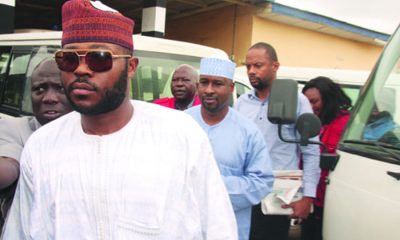
 metro2 days ago
metro2 days agoEFCC re-arraigns son of ex-PDP chairman for alleged N2.2bn oil subsidy fraud
-

 metro19 hours ago
metro19 hours agoRamadan ends in Nigeria, Sultan announces March 30 as Eid-el-Fitr
-
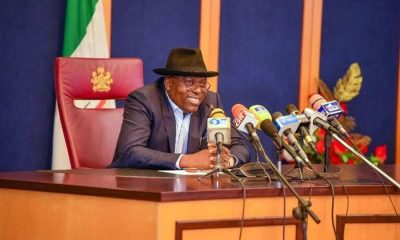
 metro1 day ago
metro1 day agoFubara reacts as Ex-HOS, Nwaeke accuses him of bombing oil pipelines, Rivers Assembly
-
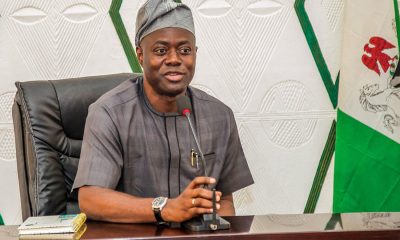
 metro2 days ago
metro2 days agoWe welcome Gov Makinde’s U-turn on Shari’ah panel – MURIC
-

 Opinion1 day ago
Opinion1 day agoBarbaric mass burning of innocents in Edo, by Farooq Kperogi
-

 Uncategorized2 days ago
Uncategorized2 days agoObasanjo’s position on Rivers emergency rule hypocritical, says Presidency
-
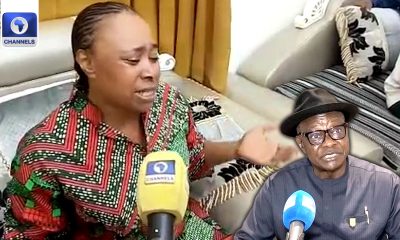
 metro1 day ago
metro1 day agoEx-Rivers HoS wife cries for help over husband’s safety

